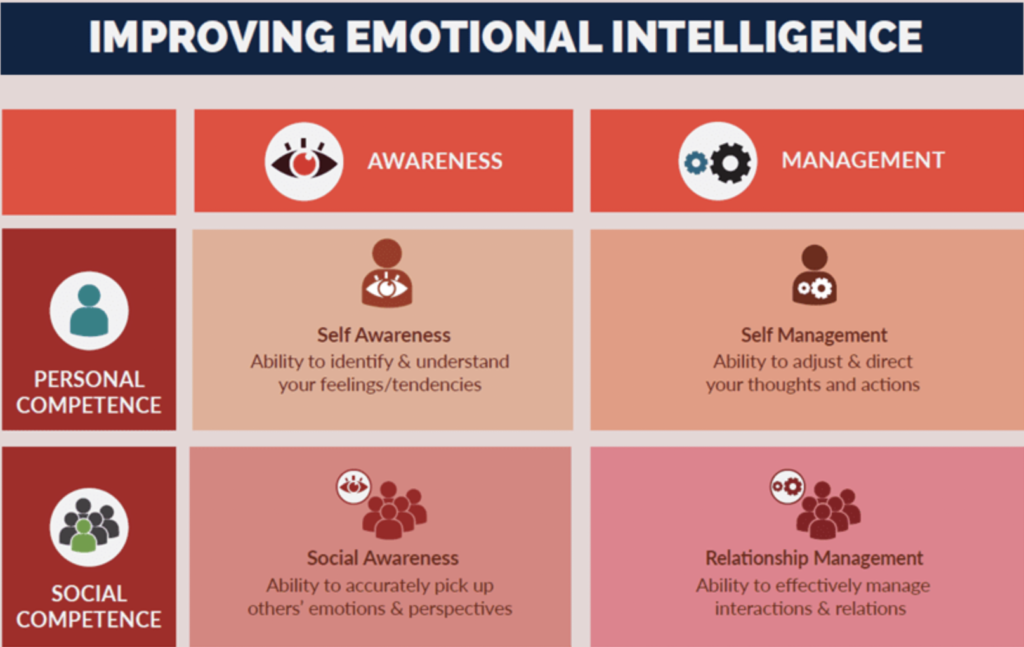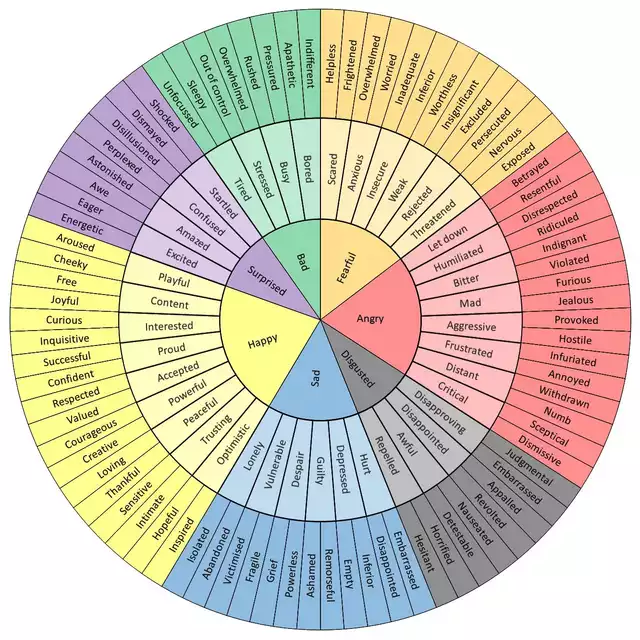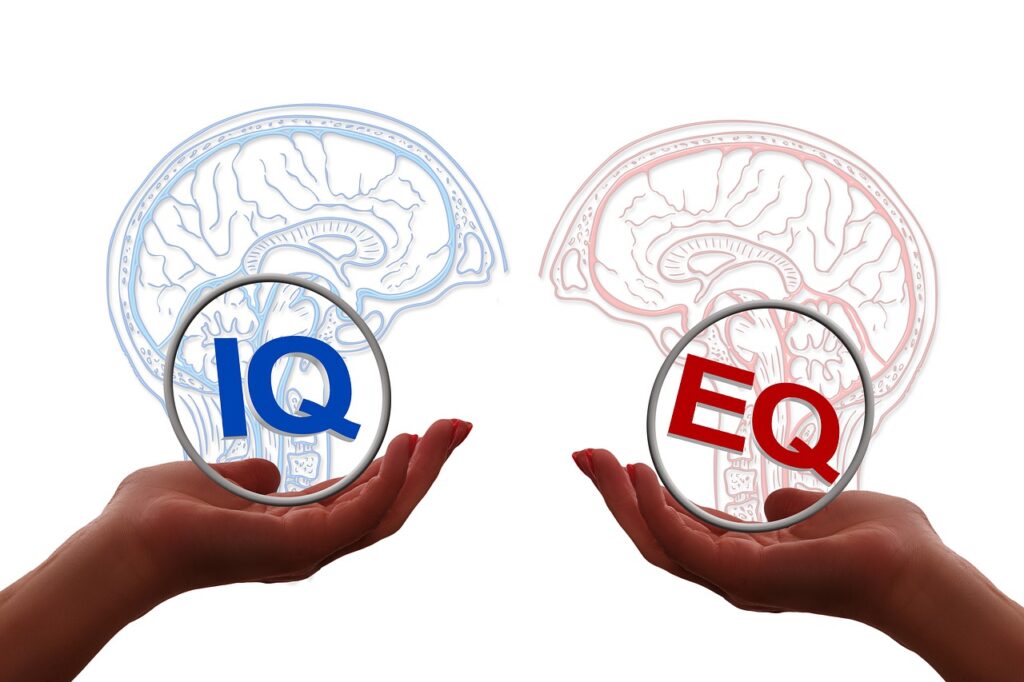- A framework for Emotional Intelligence
- Strategies to improve your Emotional Intelligence
- 1. Self-awareness: being in tune and able to describe your own emotions.
- 2. Self-management: what you say and do – not letting your emotions control you.
- 3. Social awareness: focusing on others, so that you can be more effective.
- 4. Relationship management: developing relationships that grow over time, where the needs of yourself and others are met.
- Putting Emotional Intelligence to use in specific life situations
It is widely accepted that how smart someone is will play a big factor in how successful they are in life – with ‘smart’ typically referring to their intelligence or mental abilities (as measured by their IQ score). However, there is still a significant amount of variation in life outcomes that can’t be explained by intelligence alone.
But what if I told you there was another form of intelligence that research suggests may also have a large impact on your success and that this can be developed…
Emotional Intelligence (EI) is an area that that has been well researched and has gained a lot of traction in an ever-competitive world that seeks to explain the aces from a full pack of ‘smart’ people.
Emotional Intelligence is:
Your ability to recognise and understand emotions in yourself and others, and your ability to use this awareness to manage your behaviour and relationships.
People who have high EI know and manage their own emotions well. They also read and deal effectively with other people’s, which gives them a significant advantage in various aspects of their life, from relationships to their career.
Emotional intelligence is within our biology – the part of your brain that deals with emotions receive sensory input before the rational part of your brain kicks in. We are fundamentally wired to have an emotional response to things before we have fully rationalised them.
This means your first reaction to an event is always going to be an emotional one. You have no control over this part of the process, but you can control the thoughts that follow an emotion, and you do have control over how you react to an emotion as long as you are aware of it.
Before continuing, take this really quick EI test and just note the results – I think it will give you good context for EI and its related competencies.
A framework for Emotional Intelligence
A popular framework (taken from Emotional Intelligence 2.0) outlines four key skills that make up EI:

Personal:
1. Self-awareness – your ability to accurately perceive your own emotions in the moment and understand how you tend to react to these emotions in different situations. Well-tuned self-awareness is a non-reactive and non-judgemental attention to what emotions we are feeling, what has triggered them and why we feel this way.
2. Self-management – is your ability to use awareness of your emotions to manage your behaviours in a positive way. It is not just the ability to react to triggers in a controlled manner, but also to work towards long term goals without letting your emotions derail you.
Social:
3. Social awareness – your ability to identify emotions in other people and understand what is really going on with them. This often means perceiving what other people are thinking and feeling even if you do not feel the same way.
Listening and observing are the most important elements of social awareness. Watch people as you interact with them and get a good sense of what they are thinking and feeling rather than thinking about your response – your body language is usually a give-away as to whether you are listening to someone.
4. Relationship management – your ability to use awareness of your own emotions and those of others to manage interactions successfully. This ensures clear communication and effective handling of conflict. Relationship management is also the bond you build with others over time. People who manage relationships well can see the benefit of connecting with many different people, even those they are not fond of.
Strategies to improve your Emotional Intelligence
You can work to improve these four different EI skills and, although it takes time and perseverance, with practise you should see results after a few months.
1. Self-awareness: being in tune and able to describe your own emotions.
- Knowing your emotional triggers – maybe a colleague at work does things that constantly make you feel annoyed, a child whose behaviours make you angry etc. write down a specific list of your emotional triggers, what emotions they invoke and what your typical actions are as a result.
- Reflect on your emotions – you could keep a journal to reflect on moments in the day where your behaviours were driven by your emotions and whether you would react differently now that you are able to think rationally e.g. shouted at your child, dismissed a colleague due to stress etc. You can also reflect on the positive emotions as well as physical sensations that accompanied them. Over time you will notice patterns in your emotions and the types of behaviours that follow them.
- Knowing yourself – mindfulness meditation can help to create the space needed to be present with yourself and observe how you are feeling physically which gives you an insight into how you are feeling emotionally e.g. if you are stressed or anxious you may notice you have palpitations, rapid breathing rate or a clenched jaw. More generally, being able to easily identify when you are stressed, overwhelmed, unfocussed etc will allow you to then take the right steps to get back on track.
- Feedback – you could ask someone close to you pay attention to events that trigger you emotionally e.g. you could ask your partner to simply remind you when you shout at your children. You will find a lot of feedback is there subtly anyway, for example if someone tells you you’re always grumpy!
This emotion wheel breaks down the wide spectrum of emotions to help you pinpoint which ones you are experiencing or have experienced – I genuinely didn’t appreciate how many emotional states there are!

2. Self-management: what you say and do – not letting your emotions control you.
- Breath correctly – simple yet really powerful, breathing correctly can calm nerves and reduce stress which allows us to use our rational brain to make better decisions. Breathing should be from the belly / diaphragm in a slow and measured way (as opposed to frantic upper chest breathing).
- List emotional vs rational responses to your triggers – thinking through what exact actions you want to take when faced with the common triggers you’ve identified (your rational response). You can also do this if you’re in a stressful situation and you have a few minutes to think about your response e.g. someone has made you angry at work.
- Take a few seconds before responding – spacing techniques like counting to 10 internally, taking a few deep breaths or anything else that gives your rational brain time to catch-up with your emotional response. You will find that your response is different once you have had time to process things and a few seconds can be all that’s needed to avoid an undesired response.
- Leave a response until the following day if necessary. We’ve all sent that emotionally driven email at the end of a long stressful day. If it can wait, then it may be better to revisit the response in the morning when you have more clarity to your thoughts and are in control.
- Mentally recharging and general wellbeing – how good you feel and how well rested you are will have an impact on your mental wellbeing which is needed to avoid having uncontrolled emotional responses to triggers. This is one I will be shifting my mindset on – viewing mentally recharging as a necessity to maintain my emotional regulation not just something to do for fun or when I have the time.
Viewing it this way will make it less likely to get de-prioritised during a busy day. You need to schedule activities like exercise, yoga, walks etc. and have a good bedtime routine to avoid mental exhaustion. This mental state leads to a lower threshold for emotional reactions.
3. Social awareness: focusing on others, so that you can be more effective.
- Practise listening – be present, don’t think about your response while someone is speaking. Only take notes where necessary.
- Practise watching body language in other people – these are emotional cues:
- Eye movement – do they maintain eye contact and show interest or uncomfortably gaze away?
- Facial expressions – is their smile is authentic, do they look nervous or worried etc.
- Assess posture and tendencies to fidget as a sign of anxiety.
- Be open to experiences which allow you to truly appreciate another person’s life or practise visualising things from their perspective.
- Timing – think about whether your engagement, request, remark or question is timed well. This means judging someone’s emotional state and timing your engagement to maximise the likelihood of them responding in the way you want.
4. Relationship management: developing relationships that grow over time, where the needs of yourself and others are met.
- Be open and curious – we all want to be successful and high performing at work, yet how many of us (including myself at times) just want to get on with our own work and not bother with anyone else. Establishing, building, and maintaining relationships are all part of our jobs. Getting to know each other helps us to understand and better interpret someone’s emotionally driven behaviours – have you ever had the ‘I get it now’ moment when you get to know someone better and realise why they do a certain thing in a certain way?
- Acknowledge the other person’s feelings – recognising and legitimising other people’s experiences can strengthen a relationship – this is probably the most crucial skill needed to maintain a romantic relationship. It not only signals to someone that you are attentive to their feelings, but being empathetic will influence your own emotional responses.
- If you’re mad, make sure it’s on purpose – “Anyone can become angry—that is easy. But to be angry with the right person, to the right degree, at the right time, for the right purpose, and in the right way, this is not easy.” Aristotle summed up this strategy perfectly. Judge when and where to express anger – selective anger adds the weight needed to this emotion and should be used to improve a relationship by signalling to others that you want their behaviour to change.
- Explain your decisions – when you are in a position of making decisions that impact others, take time to explain the ‘why’ behind the decisions while acknowledging how it will affect people.
- Don’t avoid the inevitable – we’ve all avoided that person or situation that we just don’t want to deal with. The issue is sometimes these are inevitable (like when you work with someone on a project) and a better strategy is to tackle these head on with our newly developed EI skills. Meet with them, be aware of your emotions and observe theirs, what is their body language like, understand their perspectives and think about how they view you – in all of this you are aiming to assess how to lay the foundations for a good working relationship.
Practise these strategies over the coming weeks and months then take the EI test again. Hopefully you will see improved scores, which should be translating into a positive impact on your life.
Putting Emotional Intelligence to use in specific life situations
Constant worry and anxiety
Constant worry over long periods of time (chronic anxiety) is a common condition resulting from unregulated emotions. There have been periods of my life where I have suffered from chronic anxiety – the constant worry about attainment / exams, the future, whether you will get a job, being able to afford a house etc. The list of things in life to worry about are endless and you aren’t going to be the best version of yourself under these conditions!
The first step on the road to taking back control is the self-awareness we’ve covered above – knowing the underlying drivers of your anxiety, especially learning to identify situations that trigger worry, will help you to catch worrying episodes as soon as possible. Stop and check in with yourself to identify the physical symptoms that let you know how you are feeling.
Then apply some of our self-management strategies:
- Breathing techniques to relax
- Writing an emotional – rational response list for whatever you are worrying about to help engage your rational brain
- Take steps to improve your general wellbeing – exercise, diet etc.
Relationships
There has been a lot of research analysing interactions between couples and what leads to arguments and separation. A lot of the key factors at play are essentially down to issues with EI and implementing our strategies can help.
Evidence shows couples in successful relationships usually:
- Voice complaints rather than attack their partner’s character (which has a detrimental emotional impact).
- Stick to one topic when they argue and give each partner the chance to state their point of view at the outset. The X, Y, Z technique that you can agree to use with your partner is that you focus arguments on ‘you did X, which made me feel Y and I’d rather you do Z in the future’ rather than moving from X to general attacks on someone’s character.
- Show each other that they are being listened to and empathised with, which in many cases is what the partner is looking for.
- Non-defensive listening and speaking is the ability to listen without reacting and draw out the key underlying issues behind what is being said in anger. Mirroring is an effective de-escalation technique where you summarise what another person has said towards you, trying to accurately describe their main points and feelings until they agree it is an accurate reflection.
- Avoid arguments becoming too intense by keeping the discussion on track, empathising, and reducing tension.
- Don’t only discuss specific issues in their relationship (parenting, money, housework etc) but also discuss their EI skills and how to jointly develop their competences in empathy, listening etc.
- Know when they are finding it difficult to regulate their emotions and take breathers to calm down.
- Monitor and challenge their negative thoughts about their partner and reflect on the positive things they do to avoid the ‘they are always like’ or ‘they always do’ types of thoughts.
Some interesting points:
- Men tend towards ‘becoming distant’ and avoiding conflict more than women, as they are more prone to emotional reactions from criticism. This in turn is a common trigger for their partner and leads to more criticism.
- A lot of our emotional behaviours have been learnt from early relationships and our parents, so we need to do a lot of reflection and practise implementing management strategies to overcome behaviours which are not benefitting our lives.
Our careers (including management and leadership specifically) are another aspect of our lives that can benefit from improved EI, but I will cover this in a separate blog to do it justice.
Short quiz:
- What are the four main skills needed to be emotionally intelligent?
- What are the benefits of developing EI?
- What are your triggers?
- Name one strategy to improve each EI ability / competency
Sources and further reading:
